当代英语研究生教程unit5-PPT关于文章结构的分析
- 格式:ppt
- 大小:462.00 KB
- 文档页数:12

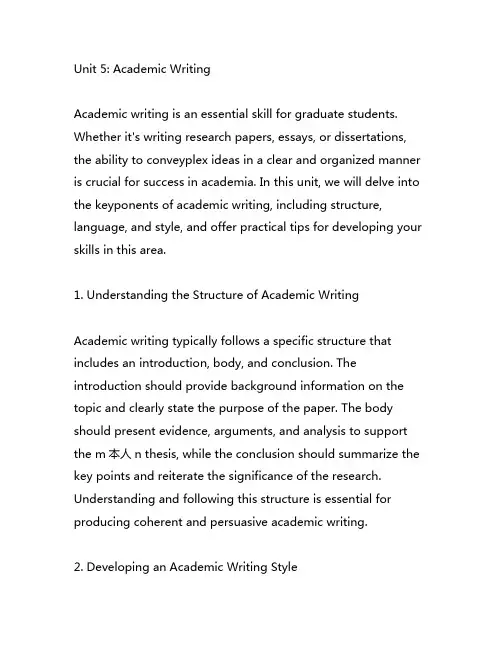
Unit 5: Academic WritingAcademic writing is an essential skill for graduate students. Whether it's writing research papers, essays, or dissertations, the ability to conveyplex ideas in a clear and organized manner is crucial for success in academia. In this unit, we will delve into the keyponents of academic writing, including structure, language, and style, and offer practical tips for developing your skills in this area.1. Understanding the Structure of Academic WritingAcademic writing typically follows a specific structure that includes an introduction, body, and conclusion. The introduction should provide background information on the topic and clearly state the purpose of the paper. The body should present evidence, arguments, and analysis to support the m本人n thesis, while the conclusion should summarize the key points and reiterate the significance of the research. Understanding and following this structure is essential for producing coherent and persuasive academic writing.2. Developing an Academic Writing StyleAcademic writing requires a formal and objective tone. This means avoiding colloquial language, personal opinions, and emotional language. Instead, focus on using clear, precise, and formal language to convey your arguments and ideas. Additionally, pay attention to the use of citations and referencing to acknowledge the sources of your information and evidence. Developing a strong academic writing style takes practice, but it is a crucial skill for graduate students to master.3. Using Language Effectively in Academic WritingIn academic writing, it is important to use language that is precise and unambiguous. Avoid vague or ambiguous language, as this can weaken the clarity and effectiveness of your writing. Additionally, pay attention to the use of transitions and cohesive devices to ensure smooth and logical connections between ideas. By using language effectively, you can enhance the coherence and flow of your academic writing.4. Incorporating Research and EvidenceAcademic writing is heavily reliant on research and evidence tosupport arguments and cl本人ms. As a graduate student, it is important to develop strong research skills and the ability to critically evaluate sources. This includes identifying reliable and credible sources, synthesizing information from multiple sources, and effectively integrating evidence into your writing. By incorporating research and evidence, you can strengthen the validity and persuasiveness of your academic writing.5. Editing and Revising Academic WritingEffective academic writing is the result of careful editing and revision. After drafting your paper, take the time to review and revise it for clarity, coherence, and organization. Pay attention to the overall structure and flow of the paper, as well as the language, style, and tone. Additionally, proofread your work for grammar, punctuation, and spelling errors. By editing and revising your academic writing, you can ensure that it meets the highest standards of clarity and accuracy.ConclusionAcademic writing is a fundamental skill for graduate students, and mastering this skill is key to success in academia. Byunderstanding the structure of academic writing, developing a formal and objective writing style, using language effectively, incorporating research and evidence, and editing and revising your work, you can produce high-quality academic writing that is clear, coherent, and persuasive. With practice and dedication, you can continue to refine your skills in academic writing and excel in your academic pursuits.。
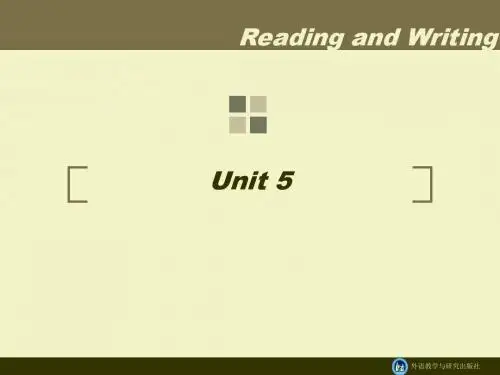


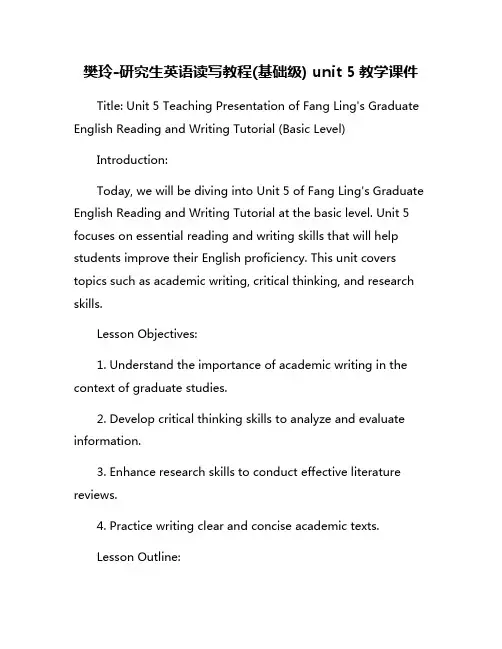
樊玲-研究生英语读写教程(基础级) unit 5教学课件Title: Unit 5 Teaching Presentation of Fang Ling's Graduate English Reading and Writing Tutorial (Basic Level)Introduction:Today, we will be diving into Unit 5 of Fang Ling's Graduate English Reading and Writing Tutorial at the basic level. Unit 5 focuses on essential reading and writing skills that will help students improve their English proficiency. This unit covers topics such as academic writing, critical thinking, and research skills.Lesson Objectives:1. Understand the importance of academic writing in the context of graduate studies.2. Develop critical thinking skills to analyze and evaluate information.3. Enhance research skills to conduct effective literature reviews.4. Practice writing clear and concise academic texts.Lesson Outline:1. Introduction to Academic Writing- Explain the purpose of academic writing and its significance in graduate studies.- Discuss the characteristics of academic writing, such as formal tone, clear structure, and citation of sources.2. Critical Thinking Skills- Define critical thinking and its role in academic writing.- Introduce strategies for critical reading, such as summarizing, analyzing, and evaluating texts.3. Research Skills- Explain the process of conducting research for academic writing.- Discuss effective ways to search for sources, evaluate their credibility, and integrate them into written work.4. Writing Practice- Provide sample writing prompts for students to practice applying academic writing principles.- Offer feedback on students’ writing and encourage peer review to improve writing skills.Conclusion:Unit 5 of Fang Ling's Graduate English Reading and Writing Tutorial at the basic level offers students a comprehensive overview of academic writing, critical thinking, and research skills. By mastering these skills, students will be better equipped to succeed in their graduate studies and beyond. Let’s work together to enhance our English proficiency and academic writing abilities!。

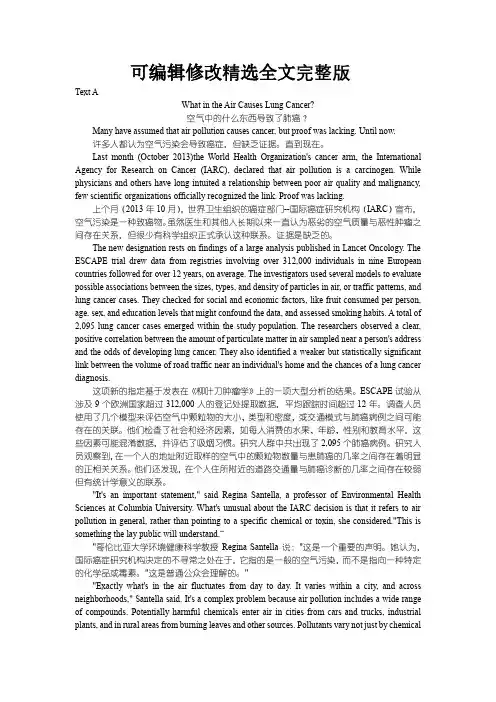
可编辑修改精选全文完整版Text AWhat in the Air Causes Lung Cancer?空气中的什么东西导致了肺癌?Many have assumed that air pollution causes cancer, but proof was lacking. Until now.许多人都认为空气污染会导致癌症,但缺乏证据。
直到现在。
Last month (October 2013)the World Health Organization's cancer arm, the International Agency for Research on Cancer (IARC), declared that air pollution is a carcinogen. While physicians and others have long intuited a relationship between poor air quality and malignancy, few scientific organizations officially recognized the link. Proof was lacking.上个月(2013年10月),世界卫生组织的癌症部门--国际癌症研究机构(IARC)宣布,空气污染是一种致癌物。
虽然医生和其他人长期以来一直认为恶劣的空气质量与恶性肿瘤之间存在关系,但很少有科学组织正式承认这种联系。
证据是缺乏的。
The new designation rests on findings of a large analysis published in Lancet Oncology. The ESCAPE trial drew data from registries involving over 312,000 individuals in nine European countries followed for over 12 years, on average. The investigators used several models to evaluate possible associations between the sizes, types, and density of particles in air, or traffic patterns, and lung cancer cases. They checked for social and economic factors, like fruit consumed per person, age, sex, and education levels that might confound the data, and assessed smoking habits. A total of 2,095 lung cancer cases emerged within the study population. The researchers observed a clear, positive correlation between the amount of particulate matter in air sampled near a person's address and the odds of developing lung cancer. They also identified a weaker but statistically significant link between the volume of road traffic near an individual's home and the chances of a lung cancer diagnosis.这项新的指定基于发表在《柳叶刀肿瘤学》上的一项大型分析的结果。

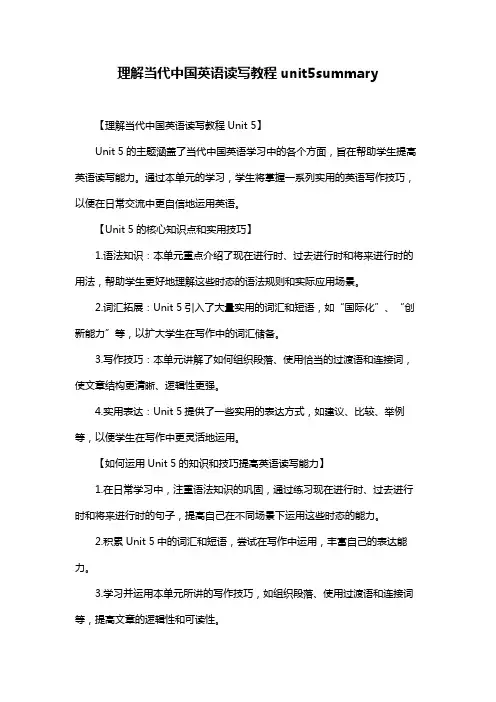
理解当代中国英语读写教程unit5summary【理解当代中国英语读写教程Unit 5】Unit 5的主题涵盖了当代中国英语学习中的各个方面,旨在帮助学生提高英语读写能力。
通过本单元的学习,学生将掌握一系列实用的英语写作技巧,以便在日常交流中更自信地运用英语。
【Unit 5的核心知识点和实用技巧】1.语法知识:本单元重点介绍了现在进行时、过去进行时和将来进行时的用法,帮助学生更好地理解这些时态的语法规则和实际应用场景。
2.词汇拓展:Unit 5引入了大量实用的词汇和短语,如“国际化”、“创新能力”等,以扩大学生在写作中的词汇储备。
3.写作技巧:本单元讲解了如何组织段落、使用恰当的过渡语和连接词,使文章结构更清晰、逻辑性更强。
4.实用表达:Unit 5提供了一些实用的表达方式,如建议、比较、举例等,以便学生在写作中更灵活地运用。
【如何运用Unit 5的知识和技巧提高英语读写能力】1.在日常学习中,注重语法知识的巩固,通过练习现在进行时、过去进行时和将来进行时的句子,提高自己在不同场景下运用这些时态的能力。
2.积累Unit 5中的词汇和短语,尝试在写作中运用,丰富自己的表达能力。
3.学习并运用本单元所讲的写作技巧,如组织段落、使用过渡语和连接词等,提高文章的逻辑性和可读性。
4.多进行英语写作练习,结合Unit 5的知识和技巧,不断提高自己的英语读写水平。
【针对Unit 5的练习和建议】1.针对语法知识,设置一些有关现在进行时、过去进行时和将来进行时的练习题,以检验自己对这些时态的掌握程度。
2.搜集一些英语文章,分析其中的段落结构、过渡语和连接词的使用,借鉴优秀写作技巧。
3.结合Unit 5的词汇和短语,写一篇关于中国当代英语学习的短文,展示自己的语言表达能力。
4.参加英语写作比赛或与他人进行英语写作交流,以提高自己的英语读写水平。
通过Unit 5的学习和实践,相信大家的英语读写能力会得到显著提高。

第五单元:学术写作中的逻辑连接本单元将重点介绍学术写作中常用的逻辑连接词和句式,这些连接词和句式能够帮助学术作者更好地组织文章结构,使文章逻辑性更强,层次更清晰。
1. 逻辑连接词的作用逻辑连接词是学术写作中不可或缺的一部分,它们可以连接句子、段落,甚至整篇文章,使文章的结构更加完整和紧凑。
常用的逻辑连接词包括but, however, therefore, moreover, furthermore等,它们在学术文章中起着承接、转折、因果、并列等不同的作用,帮助作者表达观点、构建论证。
2. 常用逻辑连接词及其使用方法2.1 but和howeverbut表示转折关系,常用于连接两个对立的观点,如“It is a challenging task, but it is worth trying.”而however则表示转折或对比,一般用在句子中部分,用逗号隔开,“The weather was bad, however, we still went out for a walk.”2.2 therefore和thustherefore表示因果关系,常用于引出结论,“The exp eriment f本人led, therefore we need to make some changes.”而thus则表示结果,“The research is promising, thus it deserves further study.”2.3 moreover和furthermoremoreover用于句首,表示补充,“Moreover, there are other factors that need to be considered.”而furthermore用于句中,表示进一步的论证,“The data is consistent, furthermore, the conclusion is reliable.”3. 逻辑连接句式的应用除了逻辑连接词外,逻辑连接句式也是学术写作中常用的工具,通过适当的句式安排,可以使文章结构更加清晰和紧密。